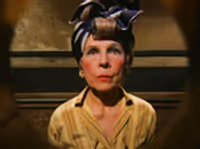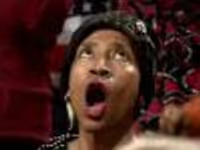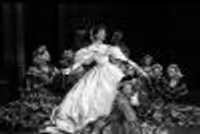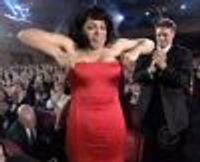What if there were no Microphones?
#25re: What if there were no Microphones?
Posted: 8/7/04 at 2:03pmMost shows music would have to be drastically reorchestrated. Listen to an old musical compared to todays musicals. The orchestrations gave opportunity for the live voice.
broadwayguy2
Broadway Legend Joined: 5/18/03
#26re: What if there were no Microphones?
Posted: 8/7/04 at 3:11pm
it is not just that.
yes, mics are agreat equilizer for singers... but there is more than that behind their use. In today's 'high-tech' shows, everything is automated.. all of teh moving sets and automated lightinga re run by small motors.. it is liek whispering... when one person whispers, it is still quiet.. when 50 people whisper, there WILL be some audible level of noise... the mics and sound design cover up that 'white noise'...
#27re: What if there were no Microphones?
Posted: 8/7/04 at 3:50pm
You know who I can never hear WITH A MIC?
Don Stephenson.
he has such a miniscule, tiny, soft voice....
ridiculous.
-d.b.j-
Unknown User
Joined: 12/31/69
#28re: What if there were no Microphones?
Posted: 8/7/04 at 11:02pm
I think Bernadette Peters would have no problem without a mic.
Also, I think that the people who should be really up there do not need the mics because they should be trained to be able to support themselves, as I had once heard Kristen Chenoweth discuss how she's been trained (cause she studied opera) and would love to sing without mics on stage. The mics hide minor defects in voices, and it makes some people who shouldn't be up there (cough christy carlson cough romano cough cough) slide through.
#29re: What if there were no Microphones?
Posted: 8/7/04 at 11:53pmmy school theater was dependant on mics for a completly non-actor related reason... the thater was designed wrong so the accoustics only work if you are singing from the orchestra pit
Plum
Broadway Legend Joined: 3/4/04
#30re: What if there were no Microphones?
Posted: 8/8/04 at 12:33amCertain composers...not gonna name names, but you know who they are...would either have to change their style significantly or be out of a job, because good singers can barely sing their scores 8 times a week with a mike.
MargoChanning
Broadway Legend Joined: 4/5/04
#31re: What if there were no Microphones?
Posted: 8/8/04 at 12:57am
Peters, as much as I love her (and I've seen everything she's done on Broadway since "Song and Dance"), could never have sung Rose eight times a week without heavy amplification. As it was, she was struggling just to keep her voice together for much of this recent run WITH the aid of a microphone. The first time I saw her in previews, I was in the second row, close enough to hear that she was basically marking time and very lightly crooning her way through "Small World" and "You'll Never Get Away From Me" and some of the other songs, relying on the sound system to project her sound up to the balcony and saving her voice for "Everything's Coming Up Roses" and "Roses Turn." If she had to sing full-out without the mic for the entire performance, I doubt she'd have made it past intermission for even one show, let alone 8 shows a week.
Merman, for all of the criticism of her harsh and inelegant sound, very well may be the most important singer in the history of Broadway. Her voice was created for the theatre and has never made any sense in any other realm. There's a reason she never had a significant recording career (or tv or movie career) even in her heyday, despite being the queen of Broadway -- hers was not a voice that could ever be shown off to best effect in a recording studio or on a sound stage. Her voice came off as simply too big and exposed and shrill on record no matter the style of music. Warmth and subtlety sell records and Merman's voice lacked both those qualities in spades.
Merman never understood or gave a fig about "scaling down" or refashioning her performance so that it would be "more palatable" coming at you in stereophonic sound. She was a creature of the live musical theatre through-and-through and was never really at home anywhere else.
No, Merman's timbre, diction, pitch, vibrato, and ability to project were constructed, developed and groomed with really only one aim in mind -- to be able to belt songs over a large orchestra without amplification in large Broadway houses. It wasn't a pretty voice, but it was an invaluable voice to the Broadway musical of a couple of generations ago.
There's a reason some of the greatest composers in the history of the musical theatre (Cole Porter, Irving Berlin, George Gershwin, Jules Styne et al) entrusted her with some of their greatest work more than anyone else -- they knew that she could "sell" a song all the way to the upper reaches of the balcony with every note, every word, and every syllable being clearly intelligible and on pitch over an orchestra, eight times a week. Given their status in the theatre, these composers had their pick of the finest singers of the day, singers with far more beautiful tone and far more elegant phrasing and yet they chose her. Why? This was, in part, for practical reasons -- being men of the theatre, they were willing to sacrifice a bit of tonal beauty in order to make sure their lyrics would be heard and understood and her pitch and diction were flawless. She apparently also was a fine comedienne for musical comedy -- not a great actress certainly, but believable and consistent and she knew how to land a laugh. Also her stamina and dedication we legendary. But mostly, so many people throughout the years have described the overwhelming excitement that would occur in a theatre when she would unleash that sound and it would go cascading throughout the house. It really must have been something to witness.
Now, even I thought of Ethel Merman as a sort of high camp joke when I was younger (and yes, I have a copy of the disco album) -- too broad, too brassy, too LOUD and seemingly over the top to ever be taken seriously. She typified so much of what "Old Broadway" singing was supposedly about and that voice simply didn't jibe with what I thought of as an aesthetically pleasing sound (it still doesn't) and it was difficult to understand some of the fuss so many people made over her.
Then, I'm not sure what happened. I think it was when I started going to the opera on a semi-regular basis several years ago. I found it a very different experience seeing the music in performance than listening to recordings or even watching "Live from the Met" on PBS. Witnessing singers pouring out glorious music live, over an enormous orchestra in a 4,000 seat house without amplification was truly a revelation. There were singers that I had admired for the beautiful sounds they made on CD, that I often found bland and boring in performance. And many of the singers whom I never cared for on record, would often completely blow me away live. While the sounds they made weren't always pretty, their commitment to character and the text and to using their voice as an instrument to convey emotion and character and temperament was extraordinary (I could tell several anecdotes here, but this post has gone on too long as it is).
There is an inexplicable visceral intensity that goes with being able to truly "feel" the sensation of a voice going through you in an audience unmiked, that simply cannot be conveyed via record . It is a very different experience from watching a show where everything you hear from the performers and orchestra is coming to you mixed through a sound system.
Can a "miked" performance be wonderful and thrilling and special? Of course it can. But I don't think you can fairly evaluate and compare (and denigrate) the performances of actor-singers who had/have to scale their peformances "up" because they had to project constantly to the back row of a house without amplification, to performers who can basically whisper and sing sotto voce and still be clearly heard in a house as big as the Shubert. Let's imagine what Peters or the vast majority of her contemporaries of today's Broadway would HAVE to sound like belting in the Shubert or Imperial or Winter Garden eight times a week with no mikes as Merman had to throughout most of her career -- trust me, it would be a VERY different sound than you've become accustomed to hearing from them -- harder, harsher, and much less subtle and attractive.
Personally, I feel the need to not only cut the "old girl" a bit of slack, but also to feel quite a bit intrigued at what the heck she was doing eight shows week, lo those many years ago that made her the most revered and popular performer of her era. Merman never had the luxury of vocally pacing herself through a role by lightly crooning half of the numbers into a mike glued to her forehead.
What I hear on Merman's cast albums, brassy and over-the-top as it is, has a vitality and visceral intensity and a passion and an electricity to it that is completely missing from most performers today, who don't have to give their heart and soul and lungs and vocal chords to each and every note they sing. Belty? yes. Pretty? Absolutely Not. Forced-sounding? Maybe (though since she didn't miss a single performance for decades, obviously there wasn't any forcing or straining in her basic technique).
Seeing Merman live must have been an overwhelming experience. In the case of "Gypsy" for instance, to see a Rose who has no apparent need to pace herself vocally, who utterly dominates every scene by her power and her very presence, who has a force of will and driving intensity that electrifies every moment?? ...... I'd have killed to be able to witness that.
#32re: What if there were no Microphones?
Posted: 8/8/04 at 10:44amin addition to all the autmated gizmos, don't forget the AC churning out noise, as well as the noise coming in off the street and the fact that audiences are now used to loud shows, thanks to movies and concerts...someone on broadway.com wrote a great article on it several months back.
"Hey little girls, look at all the men in shiny shirts and no wives!" - Jackie Hoffman, Xanadu, 19 Feb 2008
Ustadance
Understudy Joined: 3/23/04
#33re: What if there were no Microphones?
Posted: 8/8/04 at 10:56am...if there were no microphones, Eden Espinosa would rule the world...
Dollypop
Broadway Legend Joined: 5/15/03
#34re: What if there were no Microphones?
Posted: 8/8/04 at 10:58am
I remember the time when there WERE NO microphones and our ears were much happier! Actors and singers learned to project their voices and their diction was excellent. Orchestrators took into consideration the human voice and knew its limitations. The let the human voice float over difficult passages instead of blasting them with percussion in those parts of the score. Most importantly, the audience knew where the voices were coming from. A few weeks ago I saw the current FIDDLER on Bwy and many times I was confused about which character was speaking.
If you ask me, amplification has made a mess of live theater. Patti LuPone fully agrees with me.
BTW: Why do ORCHESTRAS have to be amplified?
#35re: What if there were no Microphones?
Posted: 8/8/04 at 11:03amI love you Margo Channing!
#36re: What if there were no Microphones?
Posted: 8/8/04 at 11:07am
1. Audiences would learn how to be quiet and listen.
2. Performers would have to project and enunciate.
3. There would have to be more strings in the orchestra pit!
Miriam
#37re: What if there were no Microphones?
Posted: 8/8/04 at 11:09amMargo, very eloquently put as usual. Thanks for explaining what the word "legend" really means.
#38re: What if there were no Microphones?
Posted: 8/8/04 at 11:12am
Wow. I remember when I first began singing, I was trained to project to the back of our 900 seat theatre. Then I went to graduate school with an even bigger house and we began using mics a lot. There's definitely a technique to working a microphone (especially a hand-held; with those small mics, anything goes and you're often completely at the mercy of the sound designer) so I wouldn't say it's better without. They're definitely skills you can acquire. I don't mind mics and I mainly don't even mind small voices behind the mics, but the problem is that the sound design for live theatrical shows is often abysmal and things are still lost in the upper reaches of a house. Stage performing used to be large...but the singing so often informs the physical that you end up with small performers performing, well, small. They pull in and communicate like they're on TV or film instead of filling a theatre with their presence.
A few people still do it well, even with the mic. Toni Colette did it in the Wild Party, Tonya Pinkins is doing it in Caroline.
#39re: What if there were no Microphones?
Posted: 8/8/04 at 2:10pm
More important question:
What if there was just a bunch of junk on Broadway instead of the thought provoking, intelligent works we see today?
Unknown User
Joined: 12/31/69
#40re: What if there were no Microphones?
Posted: 8/8/04 at 4:53pm
I think I have changed my mind. I do think that mics would obviously make all performers work so much harder, and it would be strenuous on practically everyone on stage today.
I now do agree with MargoChanning that Bernadette, although I am her biggest fan ever, would need a mic for the role of Rose, unless we wanted her to sound really unattractive to the ear. I think there are roles that some can play with or without a mic.
I personally have been trained to be able to support myself without a mic for my whole vocal training career, and so when I am onstage for recitals with mics, I will usually request to not bother because I feel that it would make it more intimate and real if I don't use one. It does also make the audience more intrigued and more prone to being quiet and listening to you.
Ethel Merman was then, and now things are different. I greatly admire her for being able to pull of all that she did on stage, but I don't enjoy her voice, and I hear her acting is not too dandy.
I think though that with mics, actors onstage can use different tones of voices between loud and soft and the tone will be heard and projected, rather than the voice having to scream out a line that would probably not be said that loud.
Videos








